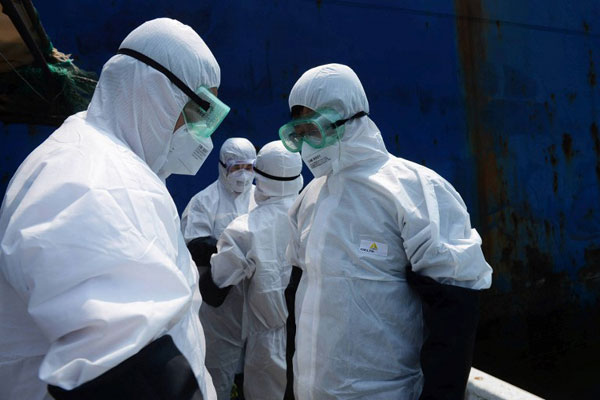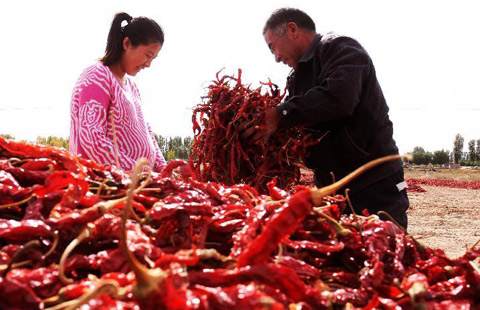Counting the far-reaching costs of an epidemic
(Agencies) Updated: 2014-10-17 09:13
 |
|
This picture taken on Aug 19, 2014 shows quarantine officers inspecting the Alpha Friendship, a bulk carrier registered in Greece that carries ores from the Pepel port in Sierra Leone, one of the Ebola-hit area in Western Africa, as the ship berths in the quarantine anchorage waiting for its entry in the port at Qingdao, in East China's Shandong province. [Photo/Agencies] |
Ebola effect may exceed previous estimates as it shows up in more countries, reports Bloomberg.
The Ebola outbreak in West Africa has raised concerns that it may spread internationally and have a similar economic impact as the SARS epidemic in 2002 and 2003.
"Fear of contagion, very early, would lead to a reduction in people's willingness to travel, eat in restaurants, drink in bars, and quite frankly do anything social," Andrew Zarnett, a Deutsche Bank AG analyst based in New York, said in a note to investors.
Severe acute respiratory syndrome, a lung disease that spread through the air, cost the global economy $40 billion, according to the Brookings Institution. The outbreak infected about 8,100 people, killed 774 and reached more than two dozen countries and regions, with the Chinese mainland, Hong Kong and Singapore the worst hit, the World Health Organization said.
The United States had 29 cases of SARS and no deaths during the outbreak from November 2002 to the middle of the following year.
Ebola, which causes bleeding in internal organs, is in theory less contagious as it is contracted through direct contact with infected bodily fluids such as blood or vomit, according to Ian Mackay, a virologist at the University of Queensland in Brisbane, Australia.
"SARS and pandemic flu both went around the world, but Ebola isn't like that," Mackay said. "We are not looking at the global distribution yet."
Yet it is more fatal, killing almost 4,500 people since the epidemic began, the WHO reported.
That is because it is concentrated in Sierra Leone, Guinea and Liberia, where inadequate health systems and poor sanitation have allowed it to thrive.
West African economies alone will lose as much as $32 billion through next year because of the outbreak, throwing Guinea and Liberia into recession, the World Bank said in a report on Oct 8.
"Any global impact will only add to this," David Evans, a senior economist at the World Bank and co-author of the report, said via e-mail. "There's some evidence that tourism in other parts of Africa has been affected. Depending on how the epidemic progresses in the other parts of the world, there will likely be additional impacts."
While developed countries have registered little impact so far, some analysts see economic fallout if the disease spreads and fuels panic.
And transmission of the disease to at least three healthcare workers in the US and Europe has raised questions about the effectiveness of control measures.
"A sustained outbreak of a high mortality disease like Ebola in any large or important economy in the global supply chain would imply significantly larger impact than SARS," Marvin Barth, an analyst at Barclays Plc in London, said in a note to clients.
|
 |
 |
| Online medical services gain popularity in China | Online sales help firms stay healthy |
- Alipay tool set to target overseas retailers
- Mini-stimulus moves lift yuan loans
- China's Jilin province seeks agro cooperation with Zambia
- Growers look to make hay in Russia
- Commission curbs local govt debt
- Zimbabwe works to woo Chinese tourists to boost tourism revenue
- New rail projects to boost growth
- Shell launches new payment facility
















